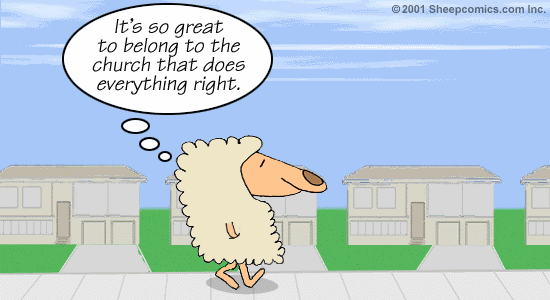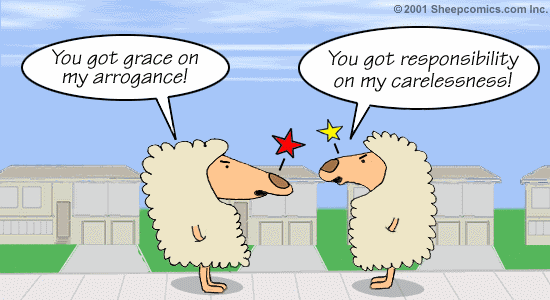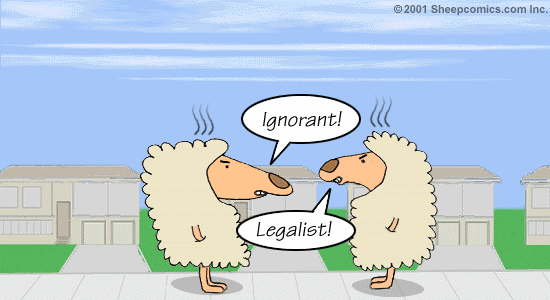







This strip was inspired by Christian Internet news groups. Iíve "lurked" and participated in a number of them over the past few years. The great thing about these news groups is that people interact, and even form electronic friendships, who would never have met any other way. Also, they give their participants a chance to interact with, and learn from, people from very different theological backgrounds. The Internet can be a great blessing.
It is, however, a mixed blessing. Often two seemingly mature individuals will begin a "thread" (a series of message postings) that rapidly degenerates into name-calling and condemnation. There are some topics that often turn saintly Internet surfers into poison posting piranhas. Topics such as: When exactly does a person go from being "unsaved" to being "saved"? When they believe? When theyíre baptized? At what second does the "saved switch" get flipped? Do you have to "do" anything to "get saved". What exactly saves you? Faith only? Faith and works?
There sure are a lot of opinions out there, but I wish there was a little more tolerance. Now, Iím not saying anyone should just go along with something they disagree with just to be "nice", but to this day Iíve never seen anyone converted to another point of view by being bludgeoned by abusive and insulting language. By "tolerance", I mean letting a person disagree, even theyíre smug, rude, or condescending, without allowing their behavior to give oneself a license to behave exactly the same way.
Of course, this kind of behavior didnít begin with the Internet. Paul must have seen it in action, or at least have received reports of it. Paul wrote to Timothy:
Don't have anything to do with foolish and stupid arguments, because you know they produce quarrels. And the Lord's servant must not quarrel; instead, he must be kind to everyone, able to teach, not resentful. Those who oppose him he must gently instruct, in the hope that God will grant them repentance leading them to a knowledge of the truth, and that they will come to their senses and escape from the trap of the devil, who has taken them captive to do his will. (2 Tim 2:23-26)
What can we get out of this? Well, it seems self-explanatory, but here is how I apply it.
First, we should be able to identify when an argument has become foolish and stupid. When you see or hear "I know you are but what am I?" or "Same to you but more of it.", you may have a stupid argument on your hands.
Servants of the Lord arenít to quarrel, and thereís no "except whenÖ" qualification for that.
Servants of the Lord are to be kind to everyone. "Everyone" includes everyone. We donít have a license to spew venom as soon we decide that someone is a "heretic bound for hell". In fact, those who Paul explicitly commands gentleness toward are those in the "trap of the devil, who has taken them captive to do his will." People escape the devil by turning to God, not to you or to me.
Servants of the Lord should be able to teach. That means imparting knowledge to others through sharing information or providing an example. I may not agree with someone on some point of doctrine, but I can try to get that person to at least understand why I believe what I do. If that person doesnít even want to do that, itís time to end the discussion.
Servants of the Lord are to instruct gently. You can put a person on the defensive or you can teach them, but you canít do both.
Servants of the Lord canít force people to believe things or change. God grants repentance. (Thereís a mystery for you.)
I could probably go on, but you get the idea. Happy surfing.